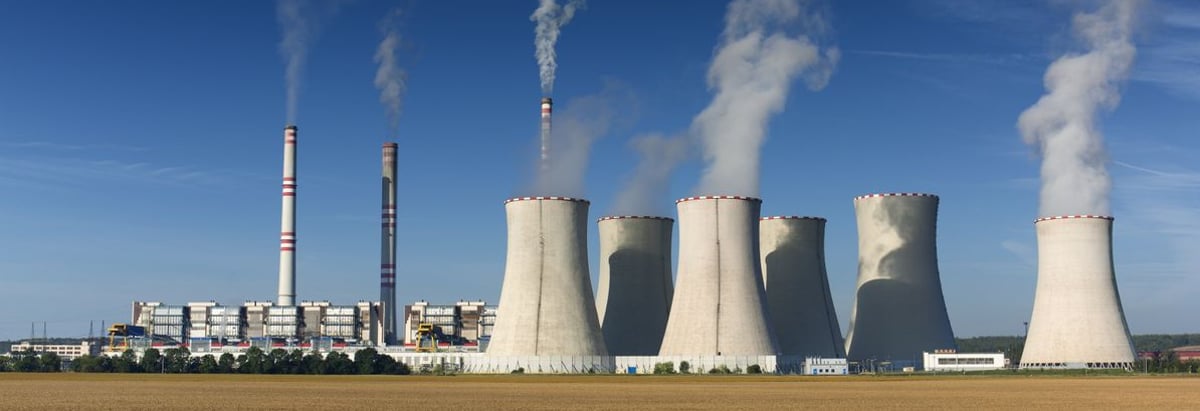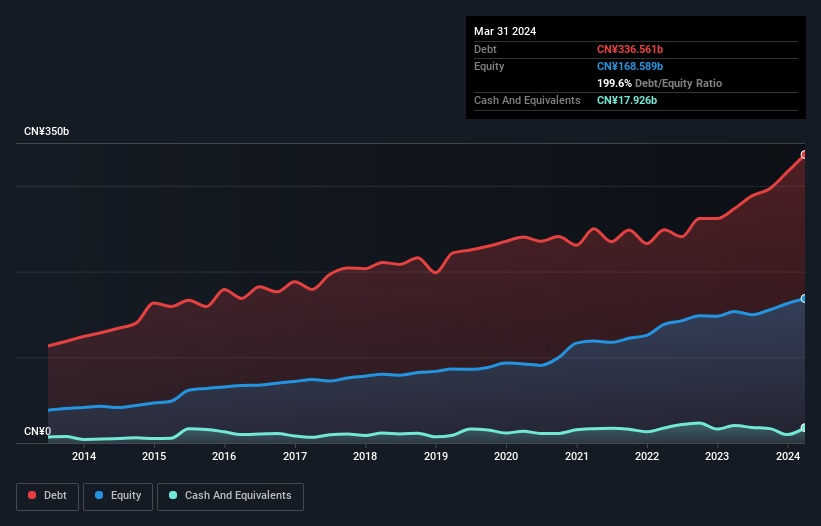- China
- /
- Renewable Energy
- /
- SHSE:601985
Does China National Nuclear Power (SHSE:601985) Have A Healthy Balance Sheet?

Legendary fund manager Li Lu (who Charlie Munger backed) once said, 'The biggest investment risk is not the volatility of prices, but whether you will suffer a permanent loss of capital.' It's only natural to consider a company's balance sheet when you examine how risky it is, since debt is often involved when a business collapses. As with many other companies China National Nuclear Power Co., Ltd. (SHSE:601985) makes use of debt. But should shareholders be worried about its use of debt?
What Risk Does Debt Bring?
Debt assists a business until the business has trouble paying it off, either with new capital or with free cash flow. If things get really bad, the lenders can take control of the business. However, a more usual (but still expensive) situation is where a company must dilute shareholders at a cheap share price simply to get debt under control. Of course, the upside of debt is that it often represents cheap capital, especially when it replaces dilution in a company with the ability to reinvest at high rates of return. When we examine debt levels, we first consider both cash and debt levels, together.
See our latest analysis for China National Nuclear Power
How Much Debt Does China National Nuclear Power Carry?
You can click the graphic below for the historical numbers, but it shows that as of March 2024 China National Nuclear Power had CN¥336.6b of debt, an increase on CN¥273.5b, over one year. On the flip side, it has CN¥17.9b in cash leading to net debt of about CN¥318.6b.

A Look At China National Nuclear Power's Liabilities
Zooming in on the latest balance sheet data, we can see that China National Nuclear Power had liabilities of CN¥96.9b due within 12 months and liabilities of CN¥300.2b due beyond that. Offsetting these obligations, it had cash of CN¥17.9b as well as receivables valued at CN¥24.4b due within 12 months. So its liabilities outweigh the sum of its cash and (near-term) receivables by CN¥354.7b.
This deficit casts a shadow over the CN¥196.4b company, like a colossus towering over mere mortals. So we'd watch its balance sheet closely, without a doubt. At the end of the day, China National Nuclear Power would probably need a major re-capitalization if its creditors were to demand repayment.
We measure a company's debt load relative to its earnings power by looking at its net debt divided by its earnings before interest, tax, depreciation, and amortization (EBITDA) and by calculating how easily its earnings before interest and tax (EBIT) cover its interest expense (interest cover). This way, we consider both the absolute quantum of the debt, as well as the interest rates paid on it.
China National Nuclear Power has a rather high debt to EBITDA ratio of 6.9 which suggests a meaningful debt load. But the good news is that it boasts fairly comforting interest cover of 4.7 times, suggesting it can responsibly service its obligations. China National Nuclear Power grew its EBIT by 6.0% in the last year. That's far from incredible but it is a good thing, when it comes to paying off debt. When analysing debt levels, the balance sheet is the obvious place to start. But ultimately the future profitability of the business will decide if China National Nuclear Power can strengthen its balance sheet over time. So if you want to see what the professionals think, you might find this free report on analyst profit forecasts to be interesting.
But our final consideration is also important, because a company cannot pay debt with paper profits; it needs cold hard cash. So it's worth checking how much of that EBIT is backed by free cash flow. Over the last three years, China National Nuclear Power saw substantial negative free cash flow, in total. While that may be a result of expenditure for growth, it does make the debt far more risky.
Our View
To be frank both China National Nuclear Power's conversion of EBIT to free cash flow and its track record of staying on top of its total liabilities make us rather uncomfortable with its debt levels. Having said that, its ability to grow its EBIT isn't such a worry. Taking into account all the aforementioned factors, it looks like China National Nuclear Power has too much debt. That sort of riskiness is ok for some, but it certainly doesn't float our boat. When analysing debt levels, the balance sheet is the obvious place to start. However, not all investment risk resides within the balance sheet - far from it. To that end, you should learn about the 2 warning signs we've spotted with China National Nuclear Power (including 1 which is a bit concerning) .
If you're interested in investing in businesses that can grow profits without the burden of debt, then check out this free list of growing businesses that have net cash on the balance sheet.
New: AI Stock Screener & Alerts
Our new AI Stock Screener scans the market every day to uncover opportunities.
• Dividend Powerhouses (3%+ Yield)
• Undervalued Small Caps with Insider Buying
• High growth Tech and AI Companies
Or build your own from over 50 metrics.
Have feedback on this article? Concerned about the content? Get in touch with us directly. Alternatively, email editorial-team (at) simplywallst.com.
This article by Simply Wall St is general in nature. We provide commentary based on historical data and analyst forecasts only using an unbiased methodology and our articles are not intended to be financial advice. It does not constitute a recommendation to buy or sell any stock, and does not take account of your objectives, or your financial situation. We aim to bring you long-term focused analysis driven by fundamental data. Note that our analysis may not factor in the latest price-sensitive company announcements or qualitative material. Simply Wall St has no position in any stocks mentioned.
About SHSE:601985
China National Nuclear Power
Invests in, develops, constructs, operates, and manages nuclear power projects in the People's Republic of China.
Questionable track record with imperfect balance sheet.
Market Insights
Community Narratives




